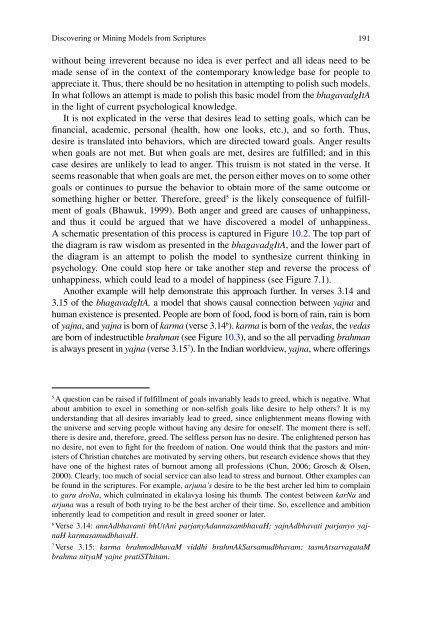Spirituality and Indian Psychology: Lessons from ... - Mandhata Global
Spirituality and Indian Psychology: Lessons from ... - Mandhata Global
Spirituality and Indian Psychology: Lessons from ... - Mandhata Global
You also want an ePaper? Increase the reach of your titles
YUMPU automatically turns print PDFs into web optimized ePapers that Google loves.
Discovering or Mining Models <strong>from</strong> Scriptures<br />
without being irreverent because no idea is ever perfect <strong>and</strong> all ideas need to be<br />
made sense of in the context of the contemporary knowledge base for people to<br />
appreciate it. Thus, there should be no hesitation in attempting to polish such models.<br />
In what follows an attempt is made to polish this basic model <strong>from</strong> the bhagavadgItA<br />
in the light of current psychological knowledge.<br />
It is not explicated in the verse that desires lead to setting goals, which can be<br />
financial, academic, personal (health, how one looks, etc.), <strong>and</strong> so forth. Thus,<br />
desire is translated into behaviors, which are directed toward goals. Anger results<br />
when goals are not met. But when goals are met, desires are fulfilled; <strong>and</strong> in this<br />
case desires are unlikely to lead to anger. This truism is not stated in the verse. It<br />
seems reasonable that when goals are met, the person either moves on to some other<br />
goals or continues to pursue the behavior to obtain more of the same outcome or<br />
something higher or better. Therefore, greed 5 is the likely consequence of fulfillment<br />
of goals (Bhawuk, 1999). Both anger <strong>and</strong> greed are causes of unhappiness,<br />
<strong>and</strong> thus it could be argued that we have discovered a model of unhappiness.<br />
A schematic presentation of this process is captured in Figure 10.2. The top part of<br />
the diagram is raw wisdom as presented in the bhagavadgItA, <strong>and</strong> the lower part of<br />
the diagram is an attempt to polish the model to synthesize current thinking in<br />
psychology. One could stop here or take another step <strong>and</strong> reverse the process of<br />
unhappiness, which could lead to a model of happiness (see Figure 7.1).<br />
Another example will help demonstrate this approach further. In verses 3.14 <strong>and</strong><br />
3.15 of the bhagavadgItA, a model that shows causal connection between yajna <strong>and</strong><br />
human existence is presented. People are born of food, food is born of rain, rain is born<br />
of yajna, <strong>and</strong> yajna is born of karma (verse 3.14 6 ). karma is born of the vedas, the vedas<br />
are born of indestructible brahman (see Figure 10.3), <strong>and</strong> so the all pervading brahman<br />
is always present in yajna (verse 3.15 7 ). In the <strong>Indian</strong> worldview, yajna, where offerings<br />
5 A question can be raised if fulfillment of goals invariably leads to greed, which is negative. What<br />
about ambition to excel in something or non-selfish goals like desire to help others? It is my<br />
underst<strong>and</strong>ing that all desires invariably lead to greed, since enlightenment means flowing with<br />
the universe <strong>and</strong> serving people without having any desire for oneself. The moment there is self,<br />
there is desire <strong>and</strong>, therefore, greed. The selfless person has no desire. The enlightened person has<br />
no desire, not even to fight for the freedom of nation. One would think that the pastors <strong>and</strong> ministers<br />
of Christian churches are motivated by serving others, but research evidence shows that they<br />
have one of the highest rates of burnout among all professions (Chun, 2006; Grosch & Olsen,<br />
2000). Clearly, too much of social service can also lead to stress <strong>and</strong> burnout. Other examples can<br />
be found in the scriptures. For example, arjuna’s desire to be the best archer led him to complain<br />
to guru droNa, which culminated in ekalavya losing his thumb. The contest between karNa <strong>and</strong><br />
arjuna was a result of both trying to be the best archer of their time. So, excellence <strong>and</strong> ambition<br />
inherently lead to competition <strong>and</strong> result in greed sooner or later.<br />
6 Verse 3.14: annAdbhavanti bhUtAni parjanyAdannasambhavaH; yajnAdbhavati parjanyo yajnaH<br />
karmasamudbhavaH.<br />
7 Verse 3.15: karma brahmodbhavaM viddhi brahmAkSarsamudbhavam; tasmAtsarvagataM<br />
brahma nityaM yajne pratiSThitam.<br />
191

















